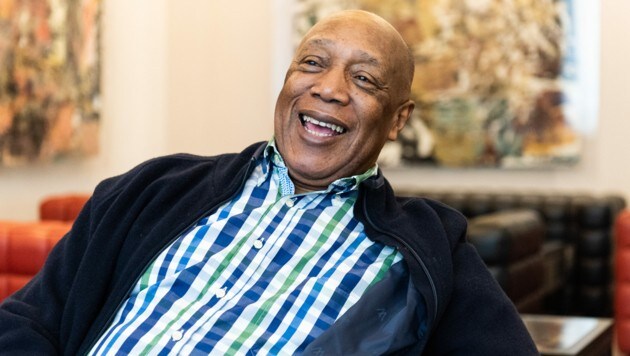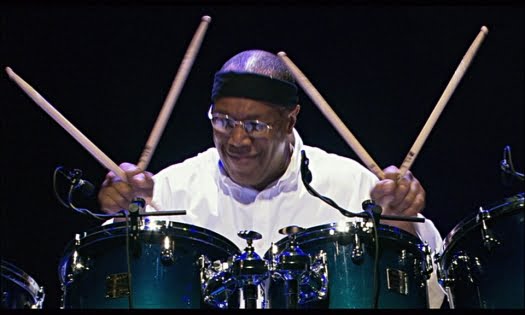He was a founding member of the legendary Mahavishnu Orchestra, recorded one of the most groundbreaking jazz rock albums of all time with “Spectrum” and made music with old companions such as Bill Evans and Randy Brecker on July 16 at the Jazz Festival in Wiesen to combine modern pop songs with jazz standards to transfer. We met the 78-year-old cult drummer for a chat.
While the Jazz Fest Wien is already giving up its series of events for the third time after two cancellations due to corona for inexplicable reasons, attempts are being made to establish a similar series in the Burgenland festival Mecca Wiesen. Not with countless individual gigs for the time being, but with a whole day full of national and international musicians. The prototype of this series of events will take place next Saturday, July 16th, and will feature illustrious names such as Billy Cobham, Bill Evans, Randy Brecker, Shake Stew and the Gerald Gradwohl Group. The first three are undoubtedly among the greatest living calibers of jazz and will slide into the present day as a Modern Standards supergroup. Modern pop songs by The Weeknd, Billie Eilish, Dua Lipa, Justin Bieber, Miley Cyrus and Co. are transferred to jazz standards. An exciting undertaking that is particularly exciting for progressive-thinking free spirits like the now 78-year-old Cobham.
The drummer, who was born in Panama and emigrated to the USA early on, became famous as a founding member of the visionary Mahavishnu Orchestra, but Cobham’s influence on the jazz, jazz-rock and fusion-jazz scene was due to his never-ending curiosity about the new and drafted undiscovered. Big names like Mike Portnoy, Jimmy Chamberlin, Kenny Aronoff, Daney Carey or the Lower Austrian Depeche Mode drummer Christian Eigner swear by the art and skills of their idol, almost like an apprentice, who prefers to present himself with reserved modesty. “When people ask me what I can teach them, I’m quickly overwhelmed,” he laughs in the “Krone” talk, “of course I know how all the basic structures work and what I enjoy, but in the end I learn to play the drums for everyone Day anew.”
https://youtu.be/YNyYzfkn4yc

Cobham recognizes that technique and basic skills are not even half the battle. If you want to develop into a truly inspirational virtuoso on your instrument, you have to sweat blood and tears. “If playing the drums is your life, then you will submit everything to it and you will automatically evolve. You have to be able to deal with phases of impatience, after all you have your whole life to develop further. You don’t really enjoy something until you know why you’re doing it and have an irrepressible passion for it.” In Harlem and later Brooklyn, Cobham caught the musical bug at an early age. At first it didn’t matter whether it was folkloristic Latino music or jazz, the drummer absorbed everything that came to him from the radio or from acquaintances like a sponge. As a favor to his father, he played his first paid gig at the age of eight.
Brightest Star
In his youth, Cobham attended workshops with Thelonious Monk and Stan Getz, and he completed his drum studies at the High School Of Music And Art in Brooklyn in 1962 with a diploma. In the years that followed, free jazz became his great love, but at the end of the 1960s he increasingly moved into the fusion and jazz rock area. As a counterpart to the legendary guitarist John McLaughlin, he revolutionized the jazz world between 1971 and 1973 in the Mahavishnu Orchestra. He also played with the likes of Horace Silver, George Benson and Larry Coryell. Cobham’s 1973 solo debut Spectrum, named Best Jazz Record by Billboard Magazine, is perhaps the brightest star in the percussionist’s dazzling résumé. No other album has revolutionized the style of jazz rock to such an extent – just as Cobham perfected playing the double bass drum and his unmistakable ambidexterity.
He regards music as universal and connects the supposedly most opposite poles in order to create a new big whole. In 1985 he finally moved to Switzerland, where he still lives happily with his wife. For the gifted freelancer, this was perhaps the most important step in his career. “In the USA there have always been too many geniuses living in far too small a space. You’re literally thrown into a box full of rats, where all the musicians cannibalize each other.” Cobham was never above securing his financial freedom by recording commercial jingles and constantly making good contacts. “In Germany, for example, I played in small shops for years, which was just right for me. In America people aren’t interested in you as an artist, here in Europe I’ve had endless, very good conversations.”
When Cobham first heard about Austria, he thought it was 75 percent mountains and that jazz was a foreign word here. “You have to get rid of such prejudices quickly,” he laughs amusedly at the thought of his announcements from the past, “Americans really have no idea about Europe. I know that very well.” He got to know the advantages of Europe at an early age. In the 80s and 90s, he and his mid(e)t musicians liked to buy a train ticket to travel across Europe. For someone who puts music and performances above everything and thus penetrates into the smallest corners of many countries, it is not only the cheapest possible, but also a sustainable way of traveling. “All you had to do was show your US passport to get this beautiful train card. This also meant that we could easily transport our equipment.”
Cobham was and is a welcome guest in Austria too. Unforgotten for many is his Stadthalle appearance in 1979 with McLaughlin, Jack Bruce and Stu Goldberg. In 2009 he shone at the Nova Jazz & Blues Nights in Wiesen and just last autumn with a rousing performance at the cult Viennese jazz club Porgy & Bess. In addition to changing the rhythm and learning new tricks, Cobham has also been a successful producer and composer for some time. Since 2011 he has also been giving regular lessons and presenting his immense knowledge to future generations. “Mistakes are the beauty of art. Through them you keep working on yourself, you want to constantly improve yourself. The quickest way to get better is to listen to others and mix knowledge. Many artists suffer from their own fragility and lack self-confidence. No matter how good you are, demons will always haunt you.”
https://youtu.be/Om58HGf79Nk







More Stories
CD review: George Benson – Dreams Do Come True: When George Benson Meets Robert Farnon – 2024: Video, CD cover
The band was tight as ever. The Warren Haynes Band cuts loose: Video, Photos
Interview with Alvin Queen: Feeling Good – I heard these tunes played by … Video, new CD cover, Photos